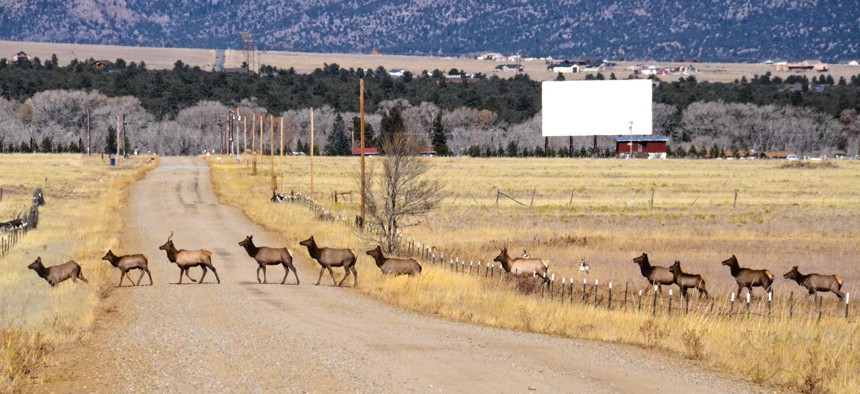Connecting state and local government leaders
COMMENTARY | A federal-state agreement signed this fall may offer a better way for the nation to maintain wildlife habitats on privately owned land.
America’s wildlife is a national treasure. From mule deer to monarchs, the natural world supports human life, fosters a deep sense of connection to nature’s bounty and serves as the backbone of our $454 billion outdoor recreation economy—boosting tourism, generating gear purchases and supporting local jobs. Without wild creatures and their habitats, America would lose a profound part of its identity.
When we imagine herds of elk and other migrating animals grazing amid fields of sagebrush or grassland, idyllic places like Yellowstone, Zion and Glacier national parks come to mind. And it’s true that these iconic public lands provide crucial habitat for many of America’s wildlife. But new research is beginning to confirm what many rural communities already know: Privately owned, working lands such as cattle ranches, agricultural fields and forests are equally important for wildlife that migrate each spring and summer from one patch of habitat to another.
The conservation of migrating wildlife, including mule deer, pronghorn and elk, is the focus of a new agreement signed by Wyoming Gov. Mark Gordon and U.S. Department of Agriculture Secretary Tom Vilsack. The memorandum of understanding provides a framework for how the state and USDA will work with voluntary landowners in Wyoming to modify outdated and deadly barbed wire fences, avoid development and restore degraded habitat in areas deemed important for migrating animals. This innovative agreement can and should be a guide for other states.
Research shows how migration pathways—sometimes hundreds of miles long—traveled by these animals are critical to their survival. But these centuries-old routes don’t follow political boundaries or stay within the borders of public land. Instead, they often cross privately owned land. “Private landowners have long provided key habitat for wildlife across Wyoming,” Gordon said at the agreement’s signing,
The grasslands that migrating animals depend on store a staggering 12% of terrestrial carbon, according to the USDA. They also are among the world’s most endangered ecosystems because of rising temperatures, drastic weather events and wildfires. To protect functioning ecosystems and Western lifestyles from climate-related threats, it’s imperative that the federal government, states, tribes, local communities and landowners work together. Today, these stakeholders and tribes are collaborating throughout the country to identify new technologies, explore innovative policies and update business practices to mitigate the growing risks faced by migratory wildlife. This is happening now in Wyoming and is within reach for other states.
While conserving wildlife and their habitat is critical to functioning ecosystems, it’s also important to state and local economies. In Wyoming, wildlife-related activities support nearly 10,000 jobs and generate more than $1 billion for the state’s economy, representing a major economic engine for the least populated state in the nation.
But for landowners the situation is more complicated. As Lesli Allison, the executive director of the Western Landowners Alliance, points out, “Most landowners care deeply about wildlife, and yet the costs associated with supporting wildlife can jeopardize their ability to stay in business.”
To address this need, the agreement provides an additional $16 million for USDA conservation programs, staff capacity and new resources for willing landowners to conduct habitat enhancement projects, lease their land as wildlife habitat, and install or remove fencing that benefits wildlife and livestock alike. These types of solutions provide a high return on investment, and resources provided by the Infrastructure Investment and Jobs Act, Inflation Reduction Act, and future farm bill authorization should continue to promote this type of collaboration. Hopefully, this partnership will be wildly successful, ensuring that wildlife populations remain healthy and private landscapes remain whole, while serving as a model that can be replicated in other states.
Marcia Argust leads The Pew Charitable Trusts’ U.S. public lands and rivers conservation project.
NEXT STORY: Exploring How to Help Homebuyers Compete with Real Estate Investors



